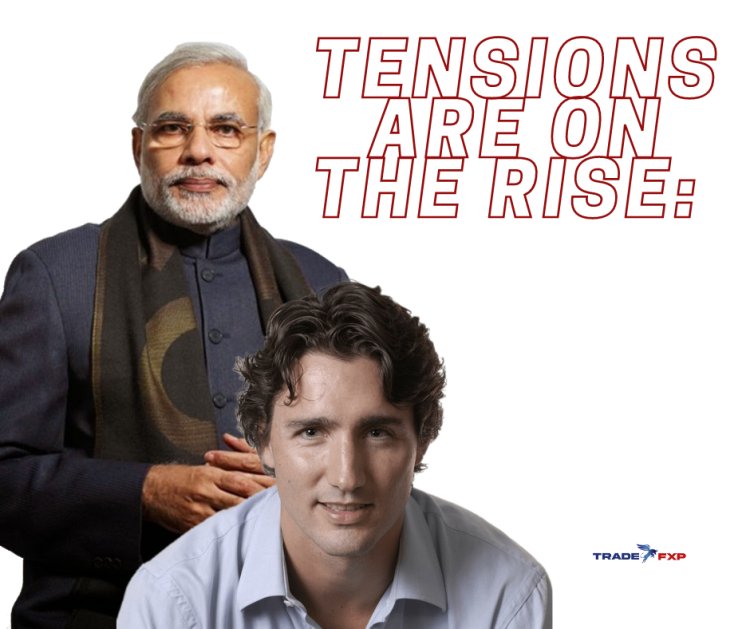Tensions are on the rise: An analysis of the fragile relationship between India and Canada
A thorough dissection of the deteriorating relationship between India and Canada was provoked by accusations and drastic diplomatic decisions. An analytical discourse based on recent MEA press briefings

India and Canada -What is happening?
Tensions are on the rise: An analysis of the fragile relationship between India and Canada
India and Canada have always enjoyed friendly and cooperative relations, working together in various economic, political, and cultural fields. However, recent developments have created tensions between the two countries and led to a significant deterioration in bilateral relations. Accusations and drastic diplomatic decisions have marked this change, which we will analyze in this article.
Chapter 1: Exposing the Diplomatic Cold War: Canada in India's Worldview
The press briefing by the spokesperson of the Ministry of External Affairs (MEA) marked a turning point in India's foreign relations, as Canada is compared to Pakistan in India's worldview. India has begun to use harsh language when talking about Canada, accusing the country of harboring terrorists, extremists, and organized crime.
It is important to understand the implications of such statements, as they greatly affect diplomatic relations and public perception. The allegations made by India have serious implications for Canada's international reputation and standing in South Asia.
Chapter 2: History of Discord: The Deterioration of Relations over the Years
India-Canada relations have faced various challenges and disagreements over the years. One of the main problems was the accusation of Canada's interference in India's internal affairs.
These accusations stem from concerns about Canada's stance on certain regional issues, such as the separatist movement in Punjab and Kashmir. India views Canada's support for certain groups as a breach of diplomatic protocol and a violation of its sovereignty.
These historical tensions have laid the groundwork for the recent deterioration in relations and exacerbated the current situation.
Chapter 3: Impact on the Indian Community in Canada: The Consequences of the Suspension of the Visa Process
The strained relationship between India and Canada has significant implications for the Indian community in Canada. As a direct result of the tensions, visa traffic at Indian missions in Canada has been suspended.
This has created difficulties for Indian students, professionals, and families who need visas for travel, work, or immigration. The visa suspension has created uncertainty and disruption, affecting the lives and aspirations of many Indians in Canada.
Chapter 4: Diplomatic Downscaling: India's Call for Canada to Reduce the Number of Missions
In response to deteriorating relations, India has demanded that Canada reduce the number of its diplomatic missions in India. This diplomatic downsizing is an important step that reflects the increasing tensions and strain on bilateral relations.
The reduction in missions would affect Canada's ability to engage effectively with India on a number of fronts, including trade, cultural exchanges, and political dialogues. This is a clear indication of the seriousness of the situation and the need for both countries to address the underlying issues.
The fractured relationship between India and Canada is worrisome because it undermines the potential for mutually beneficial cooperation between the two countries. It is important that both India and Canada engage in constructive dialogue, address the underlying grievances, and work towards restoring the friendship and cooperation that have characterized their relations in the past.
Restoring trust and repairing damaged bilateral relations will require careful diplomacy, open communication, and a willingness to understand each other's perspectives.
Only through sincere efforts and a commitment to mutual respect can India and Canada hope to put their relationship back on track and effectively address the challenges of a rapidly changing global landscape.
Exploring the controversial theory: Trudeau's alleged diversionary tactics in light of foreign interference
The theory: Trudeau's alleged diversion of media attention to India
Have you ever wondered if politicians use diversionary tactics to divert attention from controversial issues? Then buckle up, because today we're delving into a complex and potentially controversial theory about Canadian Prime Minister Justin Trudeau. It is alleged that he may have used a diplomatic spat with India to divert media attention from the ongoing controversy over Chinese interference in Canadian politics. How true is this theory? Sit back and join us on this fascinating journey to explore the intricacies of this controversy.
According to a transcript, there is a theory that Canadian Prime Minister Justin Trudeau deliberately picked a fight with India to divert media attention from allegations of Chinese interference in Canadian politics. It says Trudeau intended to manipulate the news cycle by using the India issue as a pretext to divert public attention from the ongoing controversy with China. The theory is that Trudeau wanted to portray the Liberal Party as adamantly opposed to interference while pushing Chinese interference into the background.
Background: The Chinese Interference Controversy and the Case of the 'Two Michaels
Before delving into Trudeau's alleged diversionary tactics, we should first understand the context of the Chinese interference controversy. There have been recurring allegations that the Liberal Party was supported by the Chinese Communist Party (CCP) during the Canadian election and that there were backdoor deals with China to keep two imprisoned Canadian diplomats, the so-called 'Two Michaels,' in jail. This scandal has plagued the Liberal Party and raised serious concerns about foreign influence in Canadian politics.
The Role of the Canadian Media and Liberal Party Control
An important component of this theory is the influence that the Liberal Party might have on the major news media in Canada. The theory is that the Liberal Party's control and influence over the media landscape allowed Trudeau to shift coverage from China to India. Government subsidies to these news media have raised suspicions of biased coverage and may have played an important role in influencing public opinion in favor of Trudeau's diversionary tactics.
The consequences: The Indian government's response and its impact on Trudeau
Trudeau's alleged diversionary tactics may have been initially successful, but the Indian government did not take kindly to being used as a pawn. Their strong reaction to Trudeau's actions challenged his narrative and exposed his alleged tactics. Rather than diverting attention from the controversy over Chinese interference, the Indian controversy brought the issue back into the spotlight and further intensified public scrutiny of Trudeau's government.
Looking Forward: The Evolving Story and Its Implications
The unfolding story could have far-reaching implications. The impact of Trudeau's alleged diversionary tactics and the ongoing controversies surrounding Chinese interference in Canadian politics have the potential to influence future foreign policy decisions, domestic public opinion, and even Canada's relations with India and China.
The theory surrounding Trudeau's alleged diversionary tactics is not yet fully developed, but it invites us to question the strategies of politicians and the influence they have on the media. The complexity of foreign interference in Canadian politics and the Liberal Party's role in controlling coverage raise greater concerns about the state of democracy and transparency. As responsible citizens, it is imperative for us to stay informed, ask critical questions, and hold our political leaders accountable.
What do you think about this controversial theory? Do you think Trudeau intentionally drew attention to India to overshadow the controversy over Chinese interference? Share your thoughts, and let's explore together.
Have a great journey, and may you catch some big waves on your way to prosperity!
To see this for real, click here.
https://www.myfxbook.com/members/SankarGanesan/tradefxp-trend-antitrend-day-trading/10404725
To read why you should be with us, click here
To open an account, click here.
To see our regulation certificate: click here.
To see our news with the IFMRRC: click here.
For claims, click here.
For the main site: click here.
For blogs and articles: click here.



 admin
admin 










